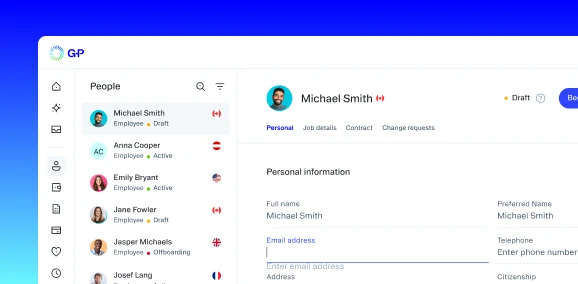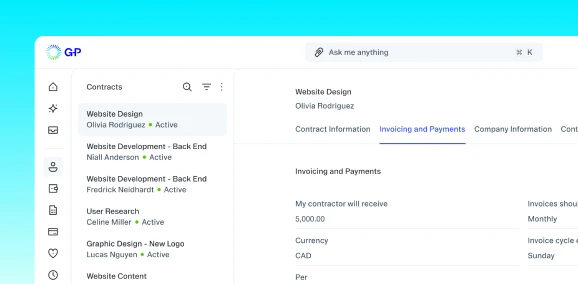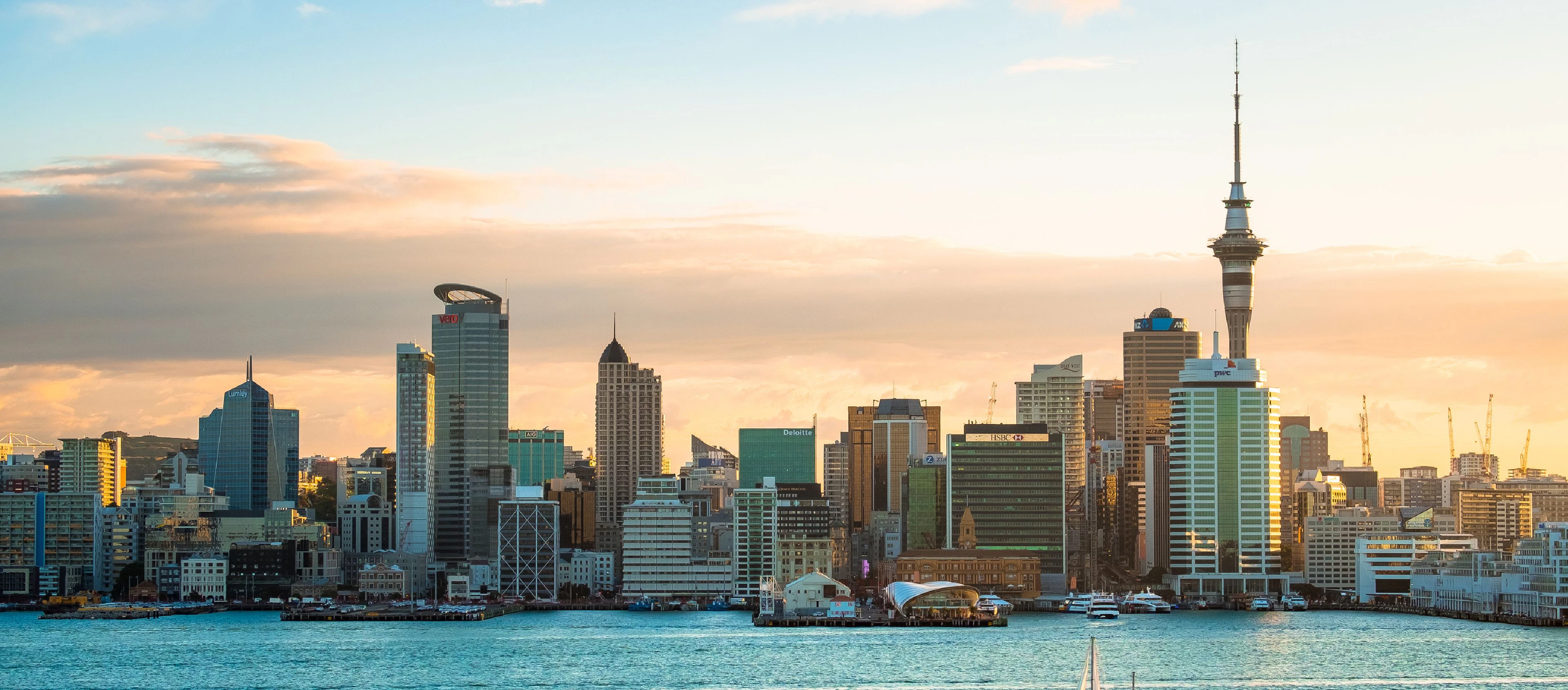Key takeaways
-
Mandatory compliance is key: New Zealand law requires written employment agreements and statutory benefits, including a minimum of four weeks' paid annual leave and employer contributions to the KiwiSaver retirement scheme. Non-compliance, especially misclassification, carries penalties up to NZD 20,000 per breach.
-
Target strategic talent hubs: Focus your hiring efforts on specific cities like Auckland (finance, technology) and Wellington (government, thriving tech sector) to efficiently tap into New Zealand's skilled talent pool.
-
Bypass entity setup with G-P: Avoid the lengthy process of establishing a local entity and streamline compliance by using G-P EOR (Employer of Record) or G-P Contractor, supported by G-P Gia™ for instant, expert HR guidance.
New Zealand’s economy is largely fueled by the agricultural industry, particularly its dairy and sheep products. However, New Zealand has a robust infrastructure and skilled talent pool in various industries.
Before expanding into New Zealand, you’ll need to understand contracts, taxes, wages, benefits, and other employment laws. Our guide will tell you everything you need to know about hiring in New Zealand.

What to know before hiring in New Zealand
If you’re expanding your business into New Zealand for the first time, there are important legal requirements to be aware of. These norms and laws influence hiring practices in New Zealand and many aspects of the employer-employee relationship, including compensation and benefits.
G-P Gia™, our AI-powered global HR agent, can answer your toughest compliance questions across 50 countries — including New Zealand — and all 50 U.S. states. Reduce your reliance on outside counsel and cut the time and cost of compliance by up to 95% with Gia.
Here are five things to know about hiring in New Zealand.
1. Working hours in New Zealand
The average workweek in New Zealand is 40 hours, typically spread over five days. Employers aren’t required to pay a premium for overtime unless it’s specified in the employment contract.
Employees get paid rest breaks and unpaid meal breaks (unless otherwise agreed in the employment contract). The number and timing of breaks depend on the length of the work period:
-
2–4 hours: One paid 10-minute rest break.
-
4–6 hours: One paid 10-minute rest break, plus one unpaid 30 minute meal break.
-
6–10 hours: Two paid 10-minute rest breaks, plus one unpaid 30 minute meal break.
These breaks are required by New Zealand law and have to be scheduled at reasonable times.
2. Time off and leave in New Zealand
New Zealand has 11 national holidays. If an employee works on a public holiday, they’re paid at least 1.5 times their normal hourly rate and get an alternative paid day off.
Employees in New Zealand get at least four weeks of paid annual leave after 12 months of continuous employment. Employees can request payment for up to one week of their annual leave instead of taking the time off. This is called “cashing up.” Unused annual leave carries over. There’s no requirement to cash out leave except upon termination.
Employees get 10 days of paid sick leave every year after six months of continuous employment. Unused days carry over, up to a cap of 20 days. Employees get three days off for bereavement of an immediate family, and one day for other bereavements at the employer’s discretion. Employees get up to 26 weeks of paid parental leave (government-funded), with extra unpaid leave and job protection.
2. Compensation in New Zealand
The New Zealand dollar (NZD) is the official currency. Minimum wage is reviewed annually and updated on April 1 every year. It’s currently NZD 23.50 per hour (2025). There are lower minimum wage rates for starting-out and training employees. This wage is currently NZD 18.80 per hour.
Bonuses aren’t legally required in New Zealand. If you choose to provide bonuses, they’re considered part of an employee’s gross earnings and are subject to standard tax. A one-off bonus is treated as a lump sum for tax purposes.
3. Taxes on employment income in New Zealand
New Zealand uses a pay-as-you-earn (PAYE) system for employment income. The current rates are:
-
10.5% on income up to NZD 14,000
-
17.5% on income between NZD14,001–48,000
-
30% on income between NZD 48,001–70,000
-
33% on income between NZD 70,001–180,000
-
39% on income over NZD 180,000
Employees pay the ACC Earner’s Levy. This funds New Zealand’s no-fault accident compensation scheme. For 2025, the rate is NZD 1.60 per NZD 100 of liable income (1.6%).
New Zealand doesn’t have separate social security or payroll taxes. There’s no general capital gains tax on employment income.
KiwiSaver is a voluntary, work-based retirement savings scheme. Employees aged 18–64 are automatically enrolled when starting new employment. They can opt out within a specific window. If employees don’t opt out, the default contribution rate is 3%. Employees can choose higher rates (4%, 6%, 8%, or 10%).
4. Health coverage in New Zealand
Employers aren't legally required to give health insurance to employees. All New Zealand residents and many work visa holders are automatically eligible for public healthcare. This is heavily subsidized by the government. Most essential healthcare services are free or low-cost at the point of use.
While employers aren’t obligated to offer group health insurance, some do so as an added benefit to attract and retain talent.
Top hiring hubs in New Zealand
Some cities in New Zealand are known for particular industries. Knowing what each city has to offer allows you to focus your hiring efforts in the right place and fill roles faster.
The top talent hubs in New Zealand are:
-
Auckland is New Zealand’s largest city and economic hub. It’s known for finance, technology, professional services, logistics, construction, and creative industries. The city is a major center for retail, tourism, and international trade.
-
Wellington is the capital and known for its government sector. It also has a thriving technology sector, film and digital media (notably “Wellywood”), and professional services.
-
Christchurch is the largest city in the South Island and is a center for manufacturing, engineering, agriculture technology (agritech), and construction (especially post-earthquake rebuild). It has a growing tech sector.
-
Hamilton is a key city for agriculture, dairy, biotechnology, and education. It’s growing in logistics and warehousing due to its central location.
-
Tauranga is known for its port (the largest in New Zealand), horticulture (especially kiwifruit), logistics, and tourism.
-
Dunedin is known for education (home to the University of Otago), health sciences, and creative industries.
Key industries in New Zealand
Understanding New Zealand’s top industries allows you to benchmark salaries and benefits. You can use this insight to make smart choices about where to invest and grow your talent pool.
The top industries in New Zealand include:
-
Agriculture and agribusiness: New Zealand is world-renowned for its dairy, meat, wool, and horticultural products. Dairy (especially milk powder and cheese), beef, lamb, and kiwifruit are major exports. Agribusiness, including food processing and agricultural technology, is central to the economy.
-
Forestry and wood processing: New Zealand has extensive plantation forests, and forestry products like logs, timber, pulp, and paper are major exports.
-
Fishing and aquaculture: The country has a robust fishing industry, including wild-caught and farmed seafood (notably mussels and salmon).
-
Construction and infrastructure: Urban development, ongoing earthquake recovery, and infrastructure upgrades are driving growth in construction and related trades.
-
Film and creative industries: The country is famous for its film production (such as The Lord of the Rings and Avatar), animation, and digital media.

The cost of hiring an employee in New Zealand
Whether you’re hiring one employee or an entire team in New Zealand, expenses are inevitable. Budget for the following:
-
Setting up an entity (unless you partner with an employer of record)
-
Advertising job positions
-
Paying referral bonuses to employees with connections in New Zealand
-
Paying an in-house hiring committee
-
Traveling to and from New Zealand, including hotel stays, meals, and transportation
-
Using a background check service for screening candidates
-
Drafting compliant employment contracts, legal review, and consultation with HR and legal experts
-
Costs for providing computers, phones, and software licenses
-
Expenses for onboarding materials and initial training
-
Mandatory employer contributions (KiwiSaver)
-
Costs for maintaining required tax and payroll records and documentation
According to G-P Verified Sources fromGia, the employer burden rate in New Zealand, which includes costs triggered on top of salaries, ranges from 3.5–5%, excluding accident insurance that can vary.
What does a company need to do to hire employees in New Zealand?
Make sure you cover these essentials before expanding your team in New Zealand:
-
Register with the New Zealand Companies Office.
-
Register with the IRD to get a tax number for payroll, GST, and other tax obligations.
-
Open a local bank account.
-
Set up a compliant payroll system to manage PAYE, ACC, KiwiSaver, and leave entitlements.
-
Prepare for employer obligations such as KiwiSaver contributions, ACC levies, and paid leave entitlements.
-
Register with WorkSafe New Zealand.
-
Set up workplace insurance.
-
Prepare onboarding processes, workplace policies, and employee handbooks.
Setting up a subsidiary in New Zealand can take weeks or months. Use G-P EOR to hire full-time employees in New Zealand without setting up your own entity. Build your team at a lower cost and with peace of mind that you’re doing so compliantly.

The steps to hiring in New Zealand
The hiring process in New Zealand is similar to the one you’re likely familiar with in your own country. It follows five basic steps: advertising the job, evaluating applications, interviewing candidates, sending job offers, and onboarding new employees.
1. Advertise job vacancies in New Zealand
Define the role, responsibilities, and required qualifications in the job description. Popular job boards in New Zealand include Seek, Trade Me Jobs, Jora, LinkedIn, and Indeed.
Best practices for drafting job ads include:
-
State the company name, job title, and location.
-
Include application instructions and a closing date.
-
Be clear about whether the role is full-time, part-time, permanent, or temporary.
-
Avoid language that could be seen as discriminatory.
2. Evaluate applications in New Zealand
Screen applications in compliance with anti-discrimination laws. Select candidates who best meet the criteria for the role. Document your reasons for shortlisting or rejecting candidates in case you need to justify your decisions. We recommend using a checklist or scoring system based on the job requirements to ensure fairness.
3. Interview candidates in New Zealand
Interview candidates who made it onto your shortlist. You can do these interviews in person or virtually. Use structured, nondiscriminatory interview questions. Gia can help you create questions that follow anti-discrimination laws in New Zealand, so you can find the best fit for the role while complying with local regulations.
4. Making job offers in New Zealand
Contact your chosen candidate to offer them a position with your company. Draft a written offer of employment, including a compliant employment agreement. This is required by New Zealand law. Make sure the employment agreement meets all statutory requirements like pay, hours, leave entitlements, and notice periods.
5. Onboarding new employees in New Zealand
Now you canonboard new employees. Register the new employee with Inland Revenue for PAYE, ACC, and KiwiSaver. Set up payroll and provide necessary workplace training and induction. Provide information on workplace policies, health and safety, and employee rights.
If you’re working with an EOR like G-P™, you won’t have to worry about the administrative burden of onboarding. We’ll streamline the process, so you can focus on training your new hire and integrating them into your company culture.
Hiring contractors in New Zealand
Working with independent contractors in New Zealand can be a cost-effective way to test the market and build a presence without the commitment of full-time employees. Contractors based in New Zealand understand local consumer behavior, rules, and business practices. They’ll be ready to start working quickly with their own equipment and established work processes.
Hiring contractors allows you to easily adjust your talent pool based on your business needs, without the complexities and costs of employment.
Before you enter an agreement with an independent contractor in New Zealand, consider the following:
1. Employees vs. independent contractors in New Zealand
It’s important to understand the difference between employees and independent contractors. In New Zealand, employers hire employees to do work and, in return, pay them a regular salary and benefits. Independent contractors provide services. Unlike employees, contractors set their schedules, use their own equipment, and work on specific projects, rather than having an ongoing role.
2. Penalties for misclassification in New Zealand
Classifying someone as a contractor when they’re not can lead to severe penalties. If misclassification occurs, you’ll have to:
-
Pay employer KiwiSaver contributions for the period of misclassification, plus possible interest.
-
Face employment law penalties of up to NZD 20,000 per breach.
-
Deal with banning orders that prevent hiring for up to 10 years.
3. How to pay contractors in New Zealand
G-P Contractor™ takes away the messy, time-consuming process of hiring and paying international contractors. You can create and issue contracts and pay contractors with just a few clicks, all while ensuring a compliant process.
Hire employees and contractors in New Zealand with G-P
Our SaaS and AI-powered products – EOR, Contractor, and Gia – support companies as they build and manage global teams.
G-P is the recognized leader in global employment with more than a decade of experience, the largest team of HR, legal, and compliance experts, and a global proprietary knowledge base.
Make your expansion to New Zealand easier with G-P. Contact us or book a demo today.





















